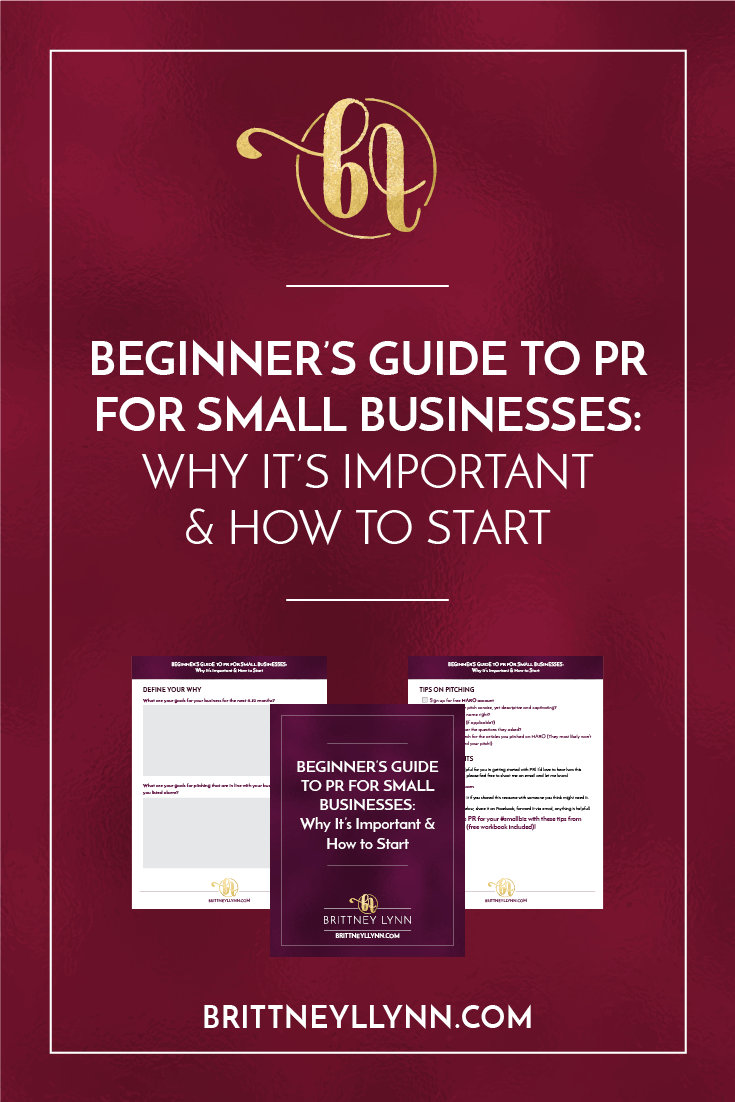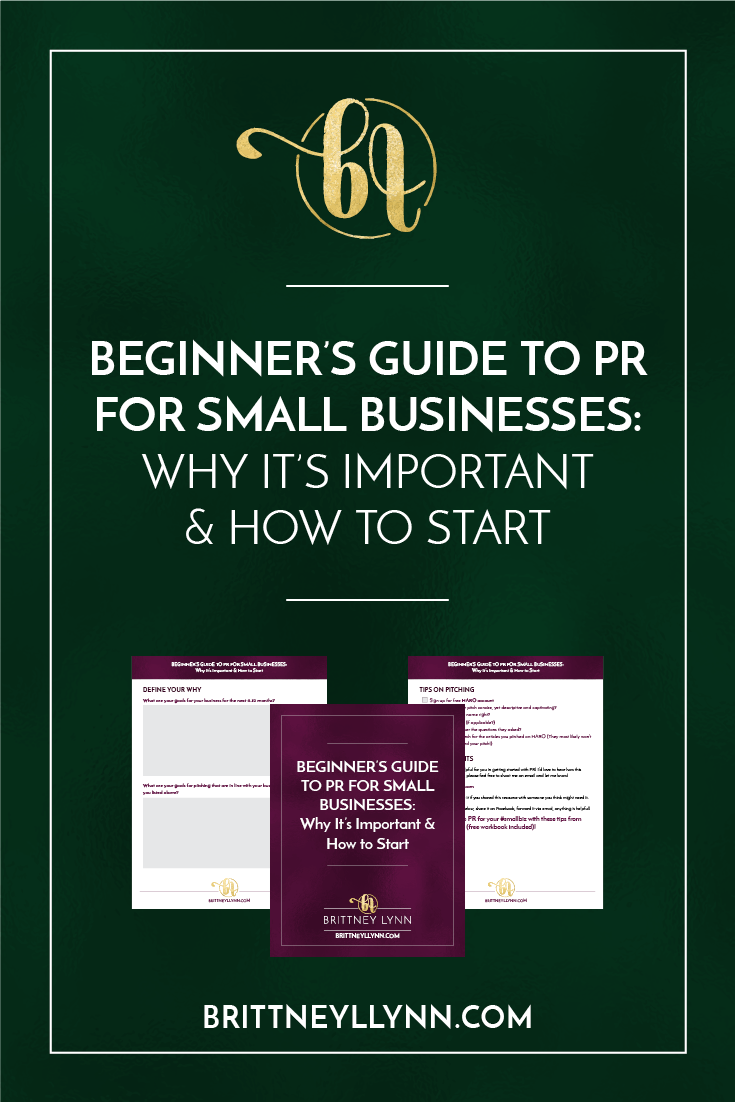Beginner's Guide To PR For Small Businesses: Why It’s Important & How To Start
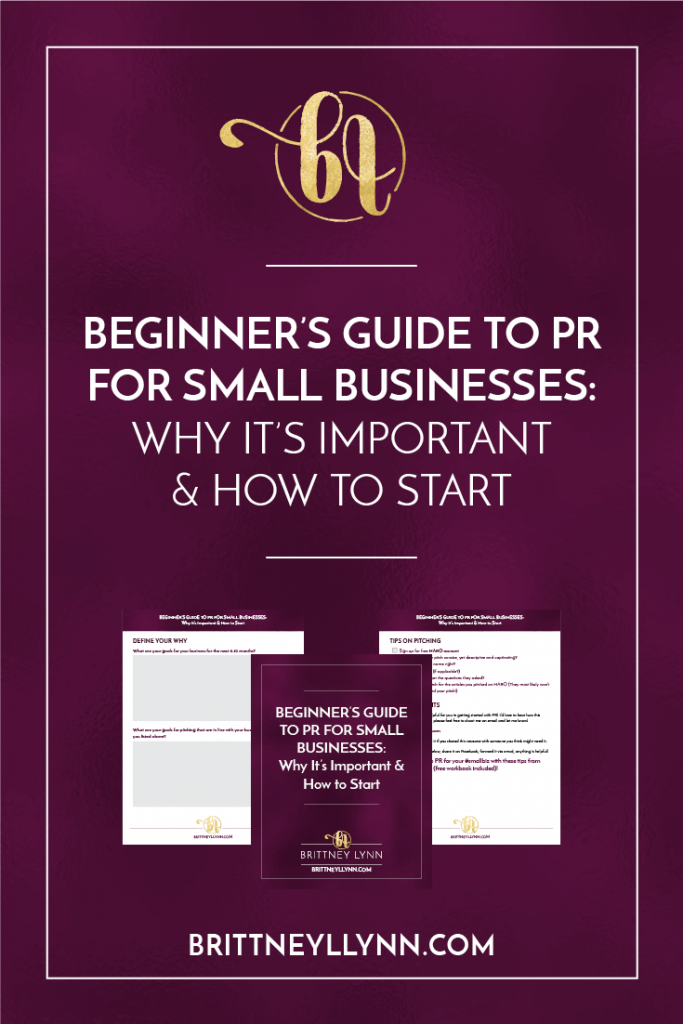 Congrats! If you are reading this new post on the blog, then you have likely started a successful small business and you are looking to grow.But first, let me guess. You’ve created a strong email list, you dedicate hours to creating blog posts, and you are constantly scheduling out social media posts… but you realize there is probably more out there you can do to cultivate your business.If this sounds familiar and you are ready to improve, then grab a pen and start taking notes on these proven tactics I’ve used to get my clients featured on Brit & Co, Glamour, USA Weekly, The Washington Post and more.You may be thinking ‘sure, PR is great, but I am a small business. How can PR help me?’As my PR services have exploded over the last 6 months, I realized that not a lot of business owners like yourself, truly understand the power of PR for small businesses and I immediately wanted to share my knowledge on the subject.Many business owners out there assume that PR can only be used by companies with big followers or celebrities when they’re going through a crisis (we all remember Britney’s breakdown of 2007, right?)The fact of the matter is, PR is far more credible than any other type of advertising out there.I know what you're thinking, and yes social media is important, email marketing can transform your business, and paid advertising can increase your bottom line but it’s always more powerful for someone else to recommend you, and that’s exactly what PR is.This series will consist of three blog posts:
Congrats! If you are reading this new post on the blog, then you have likely started a successful small business and you are looking to grow.But first, let me guess. You’ve created a strong email list, you dedicate hours to creating blog posts, and you are constantly scheduling out social media posts… but you realize there is probably more out there you can do to cultivate your business.If this sounds familiar and you are ready to improve, then grab a pen and start taking notes on these proven tactics I’ve used to get my clients featured on Brit & Co, Glamour, USA Weekly, The Washington Post and more.You may be thinking ‘sure, PR is great, but I am a small business. How can PR help me?’As my PR services have exploded over the last 6 months, I realized that not a lot of business owners like yourself, truly understand the power of PR for small businesses and I immediately wanted to share my knowledge on the subject.Many business owners out there assume that PR can only be used by companies with big followers or celebrities when they’re going through a crisis (we all remember Britney’s breakdown of 2007, right?)The fact of the matter is, PR is far more credible than any other type of advertising out there.I know what you're thinking, and yes social media is important, email marketing can transform your business, and paid advertising can increase your bottom line but it’s always more powerful for someone else to recommend you, and that’s exactly what PR is.This series will consist of three blog posts:
- Why PR is Important & How To Start Using It (this post!)
- How To Authentically Connect With Media & Influencers
- How To Get Featured On Popular Websites + Podcasts
You can download the free workbook that helps you along below.
Definition of PR + what it means for small businesses
We’re going to start at the very beginning, in case you aren’t familiar with PR whatsoever.PR stands for public relations and is defined as, “Public relations is a strategic communication process that builds mutually beneficial relationships between organizations and their publics." Public relations can also be defined as the practice of managing communication between an organization and its publics.” from Wikipedia.So in laymen's terms, this means ...PR can, in fact, be the way that you drastically improve your business. One media mention can catapult your business and can absolutely change the trajectory of where your business is headed.I’m a believer that a small business like yours benefit more from using PR than bigger businesses.And the best part is? It's usually free.
Why PR for small businesses?
Here are three reasons why you will want to consider using PR to improve your business.
- A credible way of getting your business noticed: PR is someone else with influence giving the “approval” of your business by mentioning them in an article, podcast, magazine, etc. The readers/listeners/viewers of those media outlets already trust the media outlets, otherwise, they probably wouldn’t be reading/listening. Since they trust those media outlets, they, in turn, trust the people and brands that they feature (aka you!).
- You can develop deeper relationships with your audience in a short amount of time: Anyone that’s mentioned on Oprah’s favorite things list immediately has a rapport with her readers because her readers 100% trust whatever she suggests. This is a lot quicker way to develop a relationship with a new audience that may not have known about you before.
- It can be a free way to promote your business vs. paid advertising: Most PR for small businesses (or any business for that matter) is 100% free. Yup, it’s free y’all. Yes, there is product placements that people pay for, but for most editorial features, podcast interviews, mentions in articles, etc it’s all free, bay-bee. Paid advertising has its time and place, but you're a small business and you don't have extra money to be throwing around.
 So now you're probably thinking ... okay, great, but what are the different types of PR and how can they be used for me?
So now you're probably thinking ... okay, great, but what are the different types of PR and how can they be used for me?
- Media mentions (national tv & newspapers, product placements in magazines)
- Editorial features (local and national magazines)
- Podcasts
- Working with influencers (social media influencers, YouTube, relevant industry influencers)
- Community relations (local tv, connecting with local brands, going to local events)
These are the primary types of PR for small business that are most influential right now. Just like with online marketing, PR is always changing so naturally these will update from time to time, but in general, these are types that are here to stay.Now, before you get started, remember that there is not a one size fits all PR plan for each business. Every business should have a unique PR plan.[bctt tweet="Have you ever wondered how to use #PR for your own small business? Here's my beginner's guide! " username="BrittneyLLynn"]
Getting Started
Define your purpose for pitching
Before you can craft your pitch, you need to define your purpose for pitching. It's amazing to be featured on huge websites like Entrepreneur or Oprah's Favorites, but if you aren't strategic with your pitches you won't see the return you desire.To define your purpose for pitching, you'll need to answer the following questions:
What are your overall business goals for the next 6 months - 1 year?
The whole reason for even getting PR for your small business is to help you achieve your business goals, right? So you need to make sure to define those before you start pitching like crazy.What are your goals for pitching that are in line with your business goals? More brand exposure? Increase email subscribers? Land speaking gigs? Drive more traffic to your site to increase sales?For example, if your primary business goal is to increase sales by 25% this year, then your goals for pitching should be to drive more traffic to your site and get more exposure.If your primary business goal is to grow your speaking platform, then that's what we'll focus on pitching you for, ya see how it all aligns?
What are relevant websites, podcasts, magazines, tv, and local media you can pitch yourself to that makes the most sense for your PR goals?
Yes, it'd be awesome to be featured on the Today show, but if your ideal audience doesn't watch the Today show it won't move the needle much for your bottom line.Brainstorm relevant places that make sense for your brand and your goals, not just super cool features that aren't aligned with your purpose.
Craft your pitch
Now let's start crafting your pitch! You’ll first want to do some brainstorming. This is a step that is often skipped because many see it as a “waste of time” but you couldn’t be more wrong.You need to start writing down potential pitches for your business before you can go out there and expect to be featured on the Today show. Media often move fast and you don’t want to be caught like a deer in headlights not knowing what the heck to say when they ask you follow up questions.Journalists and media can sniff through the fluff, they want to see the real story of your business, so don’t hold back.Here are questions to ask yourself while you are crafting your businesses pitch:
What are topics that you are an expert on or can speak about? What do you want to be known for?
Let’s say for example you’re the CEO of a web design agency (ahem...actually one of my clients, hi Andrew!). The questionnaire I had him fill out asked this exact question, and after a conversation, we decided to focus on the following:
- Web design (obvi)
- Branding
- Social media
- Starting a small business
- Struggles being an entrepreneur
- Starting from nothing
- Failing as an entrepreneur
Answering these questions will help you when you’re looking at places to pitch. You don’t want to get sidetracked and read about all of the places you could pitch in the world, because not all of those will be relevant to you and your business. For example, I won’t be pitching Andrew for any story that is pet related because pets aren’t a part of his story.
What makes your story unique and newsworthy?
You may say, “Nobody will care about my story,” “My story doesn’t matter.” Not true. You just haven’t found the right angle for your story yet.Everyone has unique story angle because we’re all unique individuals with different strengths. You just may have a hard time crafting your story because you haven’t been taught how. You’re in luck because I’m here to help you!When you’re thinking about your story, think of your entire life. Think of all the trials and tribulations you’ve had to go through to get where you are now. Think of how your experiences led you to your business. Physically write down (or type out, whatever you prefer!) all of these stories that come to mind.Or maybe you’re going through a trying time right at this very moment. Write out the feelings that you’re feeling. The self-doubt, the fear, the unknown. All of this can be a part of your story.Once you have rough drafts of these stories, it’s time to start crafting them into the categories of topics you listed above.Write a paragraph for each category related to the stories you just wrote down. Weave those stories into the description of each of these categories.You’ll most likely write more than a paragraph because you won’t have room to fit it all in 4-6 sentences. That’s okay.I say start with a paragraph because some people feel like they aren’t the best at writing and saying to write a full page would scare the bejeesus out of them. Start small and you can always edit, change, remove, and update your pitches later. We’re just working to get something on paper to start with.
Why should people care about what you’re pitching?
While everyone’s story is unique and interesting in its own way, we must remember that we have to put it into the context of what journalists are writing about now. You will have much better success if you submit to journalists or media if you’re pitching something that they are already looking for. That’s why we have you create your pitch stories first before submitting, so you can know what to be on the lookout for.
Sign up for HARO
Okay, now that we have our stories, let’s find some places to pitch!Help A Reporter Out (HARO) is a great free resource to check out. Everybody likes free, right? Right!HARO is an online service that connects journalists and bloggers with sources for the articles and stories they are writing about. Anyone can sign up and pitch themselves (or pitch clients like I do). It's awesome because these are stories that are already being written. You don't want to blindly pitch yourself, you want to be targeted and timely when you pitch.Here’s how to sign up for HARO:Go to their website & click on “I’m a Source”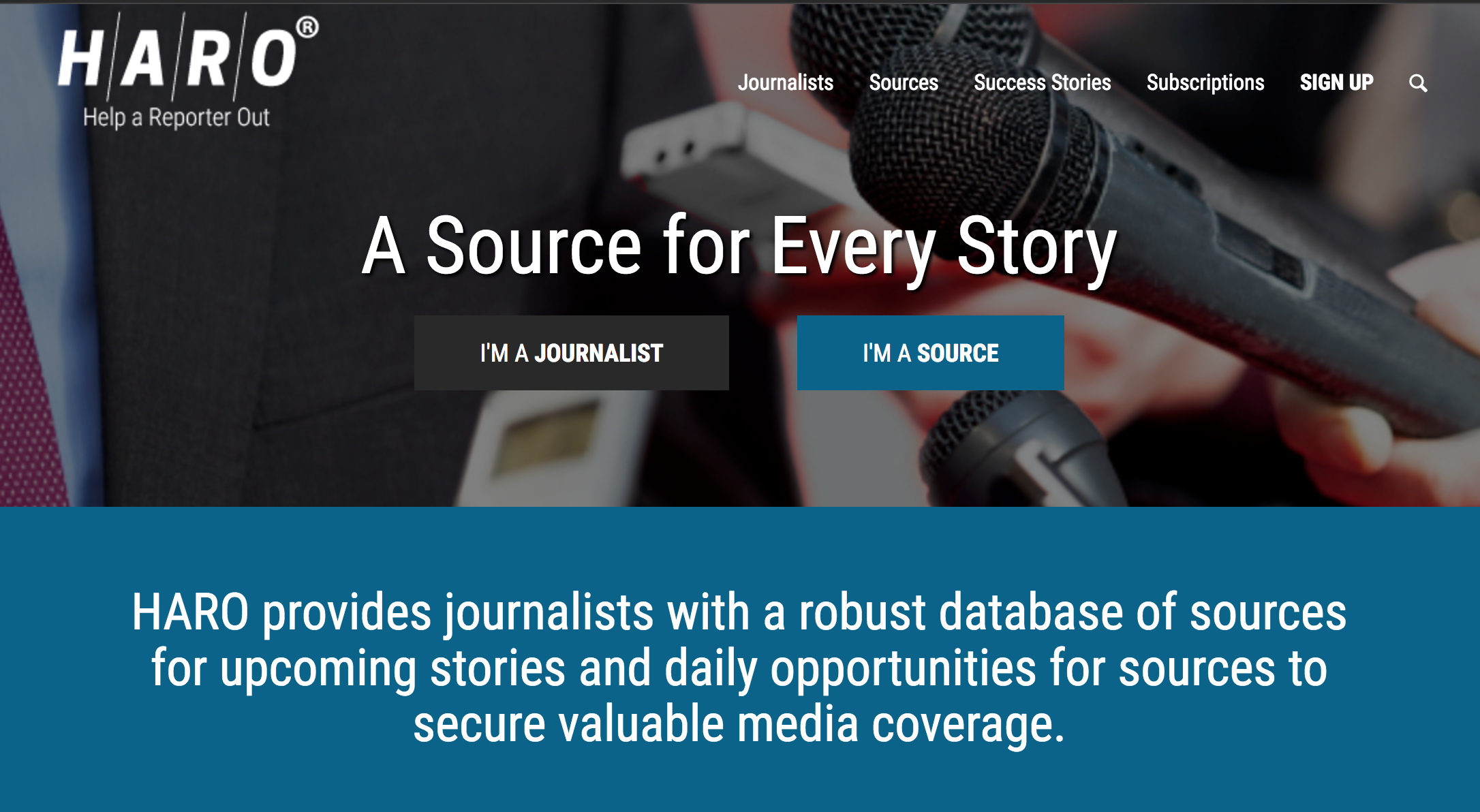 Click on “Subscribe now” & select the free option
Click on “Subscribe now” & select the free option
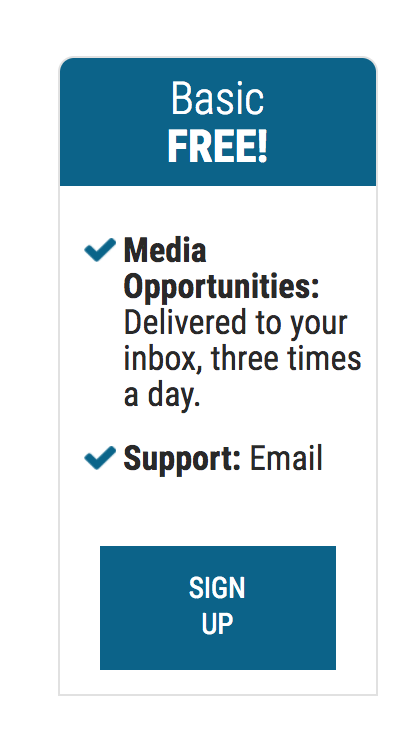 Fill out the information & receive confirmation email
Fill out the information & receive confirmation email Confirm your subscription and start pitching!
Confirm your subscription and start pitching! Here are a few tips on using HARO:
Here are a few tips on using HARO:
- Remember, you’re only looking for topics that are relevant to your unique pitches.
- You will get three emails every weekday, which yes, can be annoying but it's also very necessary. These journalists move at a fast pace and they need a quick response. Don’t bother going through a backlog of HARO emails because they will already be expired.
- Journalists don’t often reply back to you, even if they’ve used your quote. Sad, but true. They’re busy people and have deadlines, so I get it. This means you are responsible for keeping track of ones you’ve submitted. I found that several of my clients were mentioned on Redbook, Bustle, Glamour, and Brit + Co without getting a notification.
- Only send them the information that they ask for, period. If you add your entire life story and how much you love their magazine, and blah, blah, blah, they will not pay attention to it. Be concise, yet descriptive.

Send out your pitch
Now you’re ready to send your pitch! Here are a few nuggets of advice I have:
- Don’t start with the big guys if you just started your site 10 days ago. If you aren’t as established yet, there’s still an opportunity for you to be featured on other sites. But what you don’t want is to submit to a huge media outlet like New York Times or Cosmo, get featured, and your site comes crashing down because it can’t handle the web traffic. Start with smaller publications and get used to pitching before you pitch the big boys.
- Keep it as short and sweet as you can: Make sure to link to appropriate pages on your website or social media profiles.
- Follow up: I say this with caution because there are some pitches I would not recommend following up with (example: HARO, do not follow up because they will not answer). But if you are pitching directly to a magazine editor (more on that later in the series), you will want to follow up a few weeks after sending your initial pitch.
- Don’t get discouraged: Your pitch will not be accepted by everyone. Yep, it’s true. “But isn’t that a waste of my time, Brittney?!” Nope! Not at all. You're learning from your mistakes and previous pitches. No one lands every pitch they send, but sometimes one is all you need to give you a boost.
- Keep trying: It can be discouraging to hear crickets after you’ve sent pitches out, but you have to keep trying. Maybe you need to try a different angle, maybe the timing isn’t right for the pitch (more on that later in the series), maybe you contacted the wrong person. No matter the reason, keep going!
Final Thoughts
Whew, this is probably the longest blog post I’ve ever written but I felt like I needed all 2,000+ words to really educate you on what I know when it comes to PR for small businesses.In the next post, I’ll be sharing how to authentically connect with media and influencers. Don’t forget to download the free workbook! If you have any questions, I'd be happy to answer them below!
If you have any questions, I'd be happy to answer them below!

